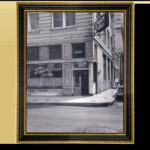Jonah Hill’s portrayal of Donnie Azoff in Martin Scorsese’s “The Wolf of Wall Street” is a performance that cemented his status as a versatile and compelling actor. The dark comedy, released in 2013, offered Hill a career-defining role alongside Leonardo DiCaprio, under the direction of one of cinema’s most revered filmmakers. This article delves into Hill’s journey to securing this iconic role, his experiences working with DiCaprio and Scorsese, and the lasting impact of “The Wolf of Wall Street” on his career.
Hill’s path to “The Wolf of Wall Street” began after his Oscar-nominated performance in “Moneyball”. As he recounted during Annette Insdorf’s “Reel Pieces” series at the 92Y, the nomination opened doors to new opportunities. One such opportunity arrived in the form of a phone call from his agent, relaying the news that he was being considered for a role opposite Leonardo DiCaprio in a Martin Scorsese film. For Hill, a lifelong Scorsese fan who grew up idolizing “Goodfellas,” this news was nothing short of surreal.
To prepare for the potential audition, Hill immersed himself in Jordan Belfort’s memoir, the source material for the film, and Terence Winter’s screenplay. Winter, known for his work on “The Sopranos” and “Boardwalk Empire,” was another significant draw for Hill, who deeply admired his writing. The script resonated with Hill immediately. He felt a profound connection to the character of Donnie Azoff, despite the character’s morally questionable actions. Hill recognized aspects of Azoff’s personality and behavior in society, viewing the role as an opportunity to explore and critique the excesses of greed and materialism.
Before any formal audition, Hill took the initiative to meet with Leonardo DiCaprio. Driven by his conviction that he was the right actor for the part, Hill boldly declared to DiCaprio his determination to play Donnie Azoff. This proactive approach and passionate commitment clearly made an impression.
Image alt text: A still from The Wolf of Wall Street featuring Jonah Hill as Donnie Azoff and Leonardo DiCaprio as Jordan Belfort laughing amidst chaotic office scenes, highlighting their dynamic partnership.
A month and a half later, the pivotal meeting with Martin Scorsese was arranged. Hill, eager to prove himself, requested an audition rather than just a meeting. However, nerves and an overheated screening room in Scorsese’s office initially threw him off balance. He humorously described mistaking the heat for anxiety before realizing the air conditioning unit was broken. Scorsese, in his characteristic relaxed manner, moved the audition to his office, putting Hill at ease. The audition itself, consisting of a few scenes and notes from Scorsese, left Hill feeling exhilarated, regardless of the outcome. He recalled walking downtown afterward, content with simply having had the chance to act in front of his idol.
The waiting period that followed stretched for two months, filled with uncertainty and daily updates from his agent about other actors being considered. Finally, the life-changing phone call came one evening. It was DiCaprio, informing Hill that Scorsese had chosen him for the role of Donnie Azoff. Hill’s ecstatic reaction – running and screaming through the streets – marked the beginning of an extraordinary chapter in his career.
Reflecting on his experience working with Scorsese, Hill emphasized the director’s unique ability to capture the multifaceted nature of human emotion. He cited the famous “Do I amuse you?” scene from “Goodfellas” with Joe Pesci as an example of Scorsese’s mastery in blending humor and terror within a single scene, mirroring the complexities of real life. This nuanced approach was something Hill deeply admired and sought to emulate in his own performance.
The infamous Quaaludes scene in “The Wolf of Wall Street,” featuring Hill and DiCaprio, became a talking point for its over-the-top physicality and comedic brilliance. Hill revealed the extensive preparation that went into filming this scene, including consulting with a drug expert. To authentically portray Donnie’s drug-induced state, Hill needed to understand the physical and psychological effects of Quaaludes and crack cocaine. A former drug addict turned counselor provided invaluable insights, guiding Hill on how to realistically embody the character’s altered state. The numerous takes required for the scene were a testament to Scorsese’s commitment to capturing the perfect blend of comedic timing and chaotic energy.
Image alt text: Close-up shot of Jonah Hill as Donnie Azoff in The Wolf of Wall Street, showcasing his intense and comedic portrayal of the character amidst the film’s chaotic and extravagant backdrop.
While Hill had built a successful career in comedy prior to “The Wolf of Wall Street,” he acknowledged that nothing could have truly prepared him for the sheer scale and intensity of working on a Scorsese film. The experience pushed him creatively and professionally, solidifying his reputation as an actor capable of handling both comedic and dramatic roles with equal skill. “The Wolf of Wall Street” not only became a critical and commercial success but also a pivotal moment in Jonah Hill’s career, elevating him to new heights and opening doors to even more challenging and diverse roles.
In conclusion, Jonah Hill’s journey to and experience in “The Wolf of Wall Street” is a testament to his talent, determination, and deep respect for cinema. His portrayal of Donnie Azoff, guided by the masterful direction of Martin Scorsese and alongside the powerhouse performance of Leonardo DiCaprio, remains a highlight of his filmography and a significant contribution to contemporary cinema. The film’s exploration of excess and morality, combined with Hill’s unforgettable performance, continues to resonate with audiences and critics alike, solidifying its place as a modern classic.

